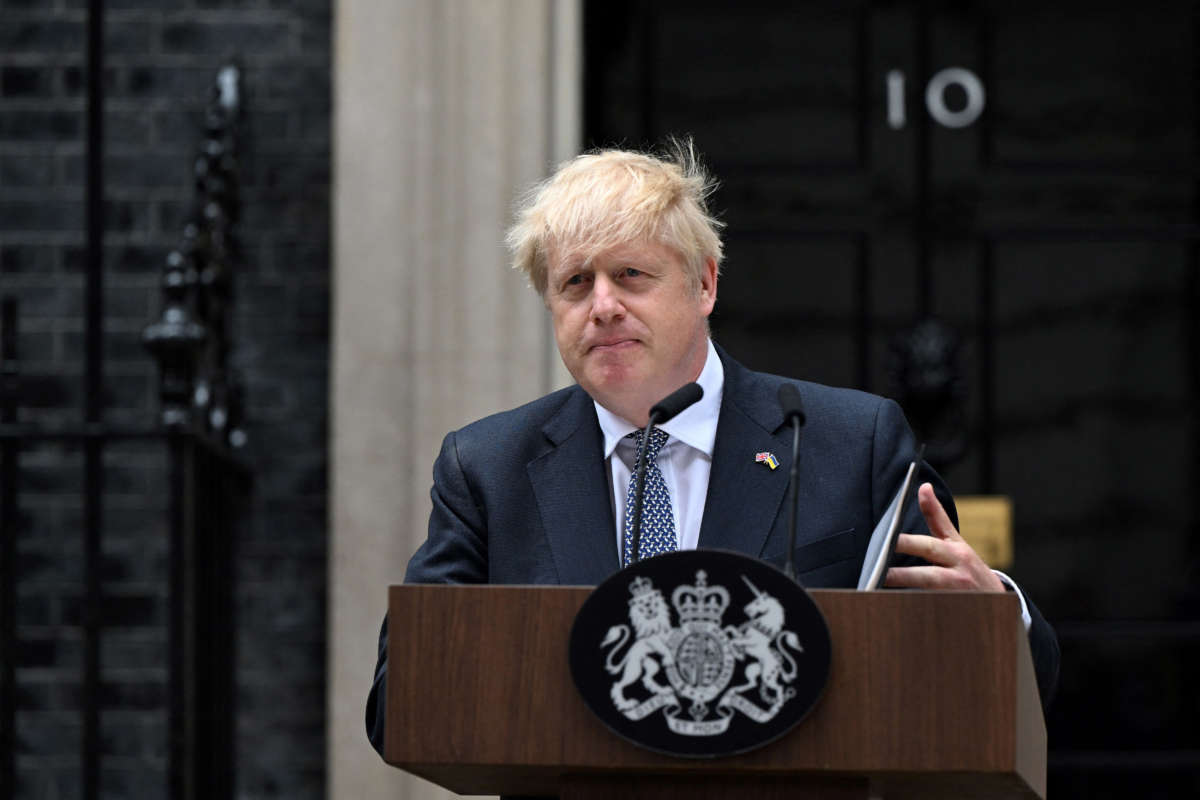Boris Johnson, the embattled, right-wing prime minister of the United Kingdom, announced on Thursday that he would be stepping down from his position, following an exodus of dozens of ministers within his own cabinet.
Prior to his announcement outside of 10 Downing Street, at least 59 members of Johnson’s administration had left their posts in response to his appointment of a minister earlier this year who had been accused of sexual assault and misconduct on numerous occasions, most recently at a party in London last week.
Johnson’s resignation comes with a caveat: He won’t officially leave his position as prime minister, he said, until a successor is chosen to replace him. This process could take several months, as the 1922 Committee, a parliamentary faction of backbenchers within his Conservative Party, will likely use the summer recess to decide who it will endorse as his replacement.
Johnson acknowledged that it was time for him to leave his post, as he had lost the trust of his own party’s members.
“It is clearly now the will of the parliamentary Conservative Party that there should be a new leader … and therefore a new prime minister,” he said.
Johnson said that he stayed on as long as possible because he felt it was his “duty” and “obligation” to continue his work. During this past week, Johnson claimed that he had a lasting mandate from when he was selected as prime minister in 2019.
Johnson lamented the resignations of his own party members — “The herd instinct is powerful and when the herd moves, it moves” — but added that he was confident that the “brilliant and Darwinian system will produce another leader.”
Johnson’s stint as prime minister was marred by a series of controversies, including one that has been dubbed “Partygate,” wherein members of his government held large gatherings and threw parties during the COVID-19 pandemic in spite of the public health restrictions that were set in place for the general population.
Johnson’s latest controversy involves allegations of sexual assault by his former deputy chief whip Chris Pincher, who he promoted to the position earlier this year. Behind the scenes, Johnson was briefed about Pincher’s past scandals — which included making improper and unwelcome advances on numerous men — but still went forward with his initial appointment in 2019, as well as his recent promotion.
Last week, Pincher attended a party where he now stands accused by two men of groping them while he was drunk. He resigned from his position shortly after the accusations were made.
In the days after Pincher’s resignation, Johnson waffled on whether he had been aware of Pincher’s past. On Tuesday, a member of his cabinet revealed details of the briefing that Johnson had received about Pincher in 2019, leading Johnson to admit in a BBC interview that he indeed knew about his former deputy’s previous sexual misconduct, and that it was a “mistake” to appoint him.
Another cabinet official recently suggested that Johnson was uncaring about Pincher’s past, saying that the prime minister had privately joked about his deputy’s actions by describing him as “Pincher by name, Pincher by nature.” Johnson did not deny saying the line in his BBC interview.
This week’s revelations led two high-ranking members of his cabinet — Chancellor of the Exchequer Rishi Sunak and health secretary Sajid Javid — to resign from their government posts in protest. Dozens more officials resigned over the next two days.
While Conservative Party members may be relieved that Johnson is exiting his post, Labour Party ministers expressed frustration that Johnson will likely remain in office through the summer and into the fall.
“We are stuck with a government that isn’t functioning,” Labour Party leader MP Keir Starmer said on Twitter. “The Prime Minister needs to go completely — not cling on for a few months.”
“If the Tory party doesn’t get rid of him, Labour will act in the national interest and bring a vote of no confidence,” Starmer added.
Join us in defending the truth before it’s too late
The future of independent journalism is uncertain, and the consequences of losing it are too grave to ignore. To ensure Truthout remains safe, strong, and free, we need to raise $46,000 in the next 7 days. Every dollar raised goes directly toward the costs of producing news you can trust.
Please give what you can — because by supporting us with a tax-deductible donation, you’re not just preserving a source of news, you’re helping to safeguard what’s left of our democracy.
